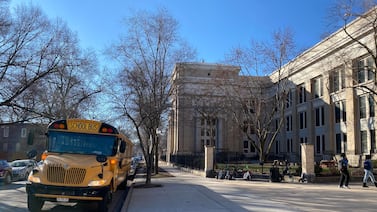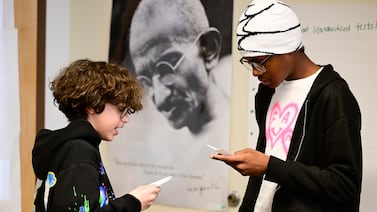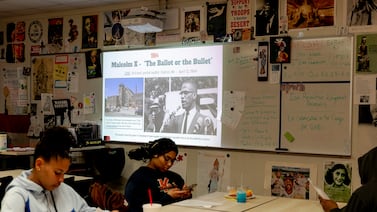Sign up for our free monthly newsletter Beyond High School to get the latest news about college and career paths for Colorado’s high school grads.
While more Colorado students are taking college-level and career education classes in high school, a new report says that trend hasn’t correlated to many more students going to college.
To better help students, the report from the Keystone Policy Center recommends that Colorado do more than just expose students to career and college options through its myriad programs. It needs schools to help students map out steps after high school so they’re better prepared for a “competitive, fast-changing, and at times chaotic world,” the report says.
Van Schoales, senior policy director for the Keystone Policy Center, said there are still difficulties getting students from K-12 to college, even if schools have the tools to connect students to college and career experiences at an earlier age.
Given the investments and time going into these programs, “you would think that there would be more college success,” Schoales said, “and there’s not as strong a correlation as you might expect.”
To improve the effectiveness of programs intended to prepare high school students, the report focuses on available statewide data, success stories in rural and urban parts of the state, and several recommendations that include new reportable data.
Colorado has created numerous programs in high school to connect students to college or career programs. Those include apprenticeships and opportunities for high school students to take college classes.
Students who achieve some sort of education beyond high school are poised to fare better economically than students with only a high school diploma.
Yet the report shows only 28.6% of low-income graduates earned a certificate or degree four years after graduating high school. Only about 50% of all students in Colorado go to college, 10 percentage points below the national rate. And the report says the growth of college- and advanced-level classes and career education programs hasn’t correlated to a much higher number of students getting to college.
Districts are trying. In their report, titled “Rural and Urban Perspectives on Post-Secondary Preparation,” the authors cited two examples of a school and district that are not only offering programs, but also helping students design what’s next for themselves.
Denver’s CEC Early College, the report says, has rigorous programs that open students’ eyes to life after graduation, require completion of college financial aid documents, and focus on personalized counseling to help as many students as possible connect to their career goals.
And Center Consolidated School District, a rural district in Southern Colorado, mixes exposure to college-level programs with helping students create a strategy for when they leave, the report says.
The district uses the state’s planning framework to help students create academic and career goals. It then follows up with projects and seminars that help students see beyond high school walls.
Not every school has taken on this work, Schoales said. For those that have, however, the state can seek to improve the system by better documenting what is and isn’t working for students.
Colorado officials want to help more Coloradans find personal and economic value in the education they get.
And the report acknowledges the state has identified goals that include encouraging more students to prepare for next steps, working with college advisers to make next steps easier for students, and developing partnerships to remove barriers.
This year, that’s been a focus for lawmakers who have pushed to reshape workforce education. They’ve also filed legislation that expands apprenticeships and other career education opportunities, while also studying the programs to recommend policy changes.
The report says the state can provide more data on dual and concurrent enrollment programs. The state can try to better understand high school programs and career and college outcomes, the report says.
It also recommends tracking what’s happened to Colorado’s high school students after they leave high school to understand how programs help them in college or in a career.
State officials could then make adjustments from there or stand up programs that are working, Schoales said, because available data doesn’t point to Colorado achieving its intended goal, especially for students of color and from low-income families.
Jason Gonzales is a reporter covering higher education and the Colorado legislature. Chalkbeat Colorado partners with Open Campus on higher education coverage. Contact Jason at jgonzales@chalkbeat.org.







